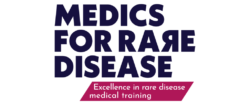Launch of rare disease content on GeNotes
We are thrilled to announce a major development in rare disease education for healthcare professionals: four knowledge summaries were published to NHS England’s GeNotes before Rare Disease Day 2024, authored by Medics4RareDiseases. This content covers the basics of rare disease, the diagnostic odyssey, patient advocacy groups and mental health in rare disease. As a result, progress has been made to address Priority 2 of the England Action Plan 2024, which is to increase awareness of rare disease among healthcare professionals.
What is the Genomics Education Programme and GeNotes?
Medics4RareDiseases has collaborated with NHS England to develop rare disease education provided by The Genomics Education Programme (GEP). The GEP is NHS England’s provider of genomics education to healthcare professionals covering two major areas: rare disease and cancer. GeNotes is a ‘just in time’ resource, providing notes for clinicians that will enable clinical decision-making about genomic testing. It is a growing and evolving resource and, with the help of Medics4rareDiseases, GeNotes is becoming a ‘go to’ place for general rare disease knowledge (including those conditions with no genetic origin).
Addressing Priority 2 of the England Action Plan
The Genomics Education Programme is named the sole delivery partner of Priority 2, developed in response to the UK Rare Diseases Framework published in 2021.
Through the collaboration with NHS England, Medics4RareDiseases has provided expertise to support the wider rare disease advocacy community and assist the integration of genomics education within rare disease. This will enable delivery of the government’s England Rare Disease Action Plan 2024, particularly Priority 2, which is increasing awareness of rare diseases among healthcare professionals.
An educated healthcare workforce that understands the overlap between genomics and rare disease will ultimately be able to provide better patient care and support.
What has been achieved?
In order to develop content that is patient and advocacy centred, M4RD’s Project Coordinator, Nadine Jefferies, has involved those with lived experience from the outset. This meant asking and listening to what the rare disease community wants their healthcare professionals to know. M4RD sent out a survey to the rare disease community, which enabled us to highlight their priorities. Then, in January 2024, we hosted a webinar so that lived experience advocates could expand on these priorities in an open discussion.
The main takeaways from the survey and the webinar were that patients ranked Priority 2 of the UK Rare Diseases Framework highest in terms of importance and urgency. Mental health and transition in rare disease were also the most popular topics that patients wanted healthcare professionals to know about. Finally, common themes that arose were that patients feel dismissed, unsupported and isolated. However, the point of this work is to find solutions to these problems, and the rare disease community suggested that signposting to support, listening to patients, co-ordinating care and recognising the burden of mental health would be pivotal in improving the lived experience of patients.
As a result of working with the rare disease community, the content strongly centres the patient voice so that healthcare professionals can understand their true expressed needs. It is also vital that we thank Metabolic Support UK for their help. They presented their Thoughts into Action report at the community webinar, which you can read here.
Take a look at the articles on GeNotes
Click on the links below to read the four knowledge summaries published on GeNotes.
- Introduction to rare disease
- The diagnostic odyssey in rare disease
- Rare disease patient advocacy groups
- Mental health and rare disease
Finally, keep an eye on the GeNotes platform, as well as the rare disease education hub on the Genomics Education Programme website as more rare disease content from Medics4RareDiseases is launched!




